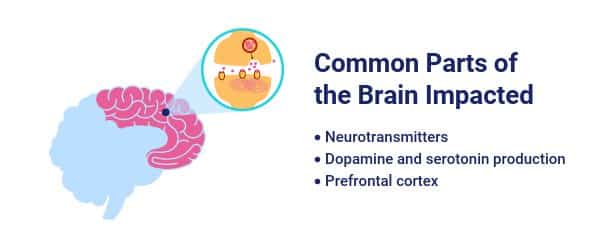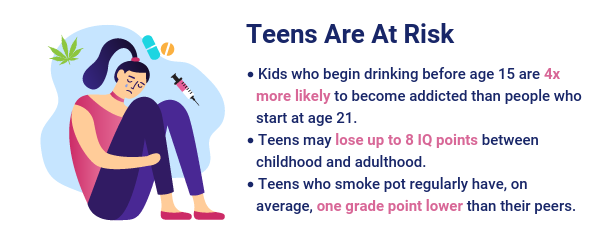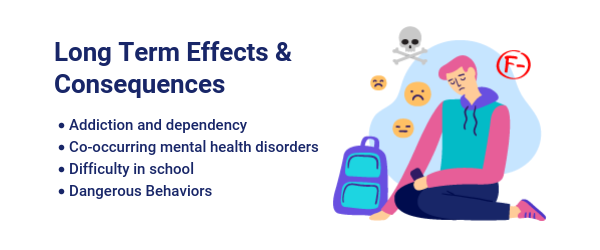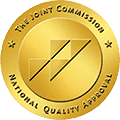A major ad campaign in the ‘80s aimed to prevent drug use by showing how drugs hurt the brain. “This is your brain,” said the announcer, holding up an unbroken egg. He then cracked it into a hot skillet and let it sizzle. He continued, “This is your brain on drugs.” While it may not be as simple as the commercial says, the basic idea is indeed true. When teens use drugs, including alcohol, the impact on the brain is significant. Occasionally, the impact is irreversible.
Table of Contents
The Impact of Drug Use on a Developing Mind
People who abuse drugs deal with serious side effects of the mind. These can include:
- Lower IQ
- Memory loss or impairment
- Slowed thinking and reaction time
- Trouble performing easy tasks
- Addiction and dependency
- Co-occurringmental health disorders
- Other brain abnormalities
Allowing these harmful substances into your body does physical damage as well — the list of physical risks is endless. It includes coma and death. But these substances attack the brain first and foremost. The harder the substances and the longer you use them, the more your brain may resemble that fried egg from the commercial.
Different drugs have different effects. Brain scans show how the brain responds to various drugs and the long-term differences in people who use drugs.

The最常见的功能of the brain impacted by drugs are neurotransmitters (the messengers of the brain), the production of chemicals related to happiness and pleasure (dopamine and serotonin), and the prefrontal cortex (responsible for planning, decision making, self-expression and moderating social behavior).
Why Are Teens More at Risk?
Numerous studies reveal that children andteens who abuse substances更有风险。例如,在15岁之前开始饮酒的孩子是four times more likelyto become addicted than people who start at age 21.
The teenage years are paramount to our brain development. This is often when we develop our personality, refine our skills and take on new responsibilities. Our brains are constantly shifting during this time to become fully matured. They are malleable, affected by the things we learn and experience. This makes the teenage brain susceptible to damage from toxic chemicals. And the effects of drugs and alcohol can slow down or even stop development in certain regions of the brain.

- Common effects on brain development involve:
- Lower IQ
- Memory loss or impairment
- Slowed thinking and reaction time
- Trouble performing easy tasks
- Addiction and dependency
- Co-occurringmental health disorders
- Other brain abnormalities
Studies show that regularmarijuana use in teenschanges the actual structure of the brain, impacting areas related to memory and problem-solving. This has an observable effect on cognition and academic performance. Teens who smoke pot regularly have, on average, one grade point lower than their peers. These teens lose up to八个智商点between childhood and adulthood. Teens who drinkheavy amounts of alcoholexhibit reduced memory, attention span, information processing and executive functioning.
What Are the Long-Term Consequences of Teen Drug Use?

If your teen’s development is disrupted, their life ahead becomes rife with new hurdles. The most obvious consequence is difficulty in school. Kids who get into drugs and alcohol often become outcasts among classmates — and not simply because their reputations may suffer due to their choice of habits. As their substance use slows their brain’s development, they can have massive difficulty keeping up in class. They’ll start to see their test scores drop. Their minds begin to wander during lessons. This can lead a teen to need remedial classes or even repeat grades, greatly harming their chances of getting into a good college or career.
In addition to school problems (and, in some cases, because of them), these teens may develop dangerous behaviors and habits. These can include unsafe sex, criminal behavior and the increasing risk of doing more drugs. It can become a vicious cycle that makes it harder for kids to reach their potential, form good relationships and lead happy lives.
Does My Teenager Need Rehab?
If you noticesigns that your teen may be using substances,防止permane快速解决问题nt brain damage and the many other problems that arise from substance abuse and addiction. If addiction is present,drug rehab treatmentmay be needed. That said, your first step is tocontact a treatment professionalas soon as possible, who can determine the level of your child’s potential problem. This person might be your family doctor or your teen’s school guidance counselor.
- Sources
对无毒美国的伙伴关系。“这是你的大脑......这是你对毒品的大脑。” Accessed June 18, 2020.
Brodwin, Erin.“Here’s how different drugs change your brain.”Business Insider, March 18, 2015. Accessed June 18, 2020.
Johns Hopkins Bloomberg School of Public Health.“Effects of Tobacco, Alcohol, and Drugs on the Developing Adolescent Brain.” Center for Adolescent Health. Accessed June 18, 2020.
National Institute on Drug Abuse (NIDA).“Drugs and the Brain.”National Institutes of Health, May 29, 2020. Accessed June 18, 2020
邻居,帕蒂。“Marijuana May Hurt The Developing Teen Brain.”NPR.org. March 3, 2014. Accessed June 18, 2020.
Squeglia, LM; Jacobus, J; Topert, SF.“物质对青少年脑发育的影响。”临床脑电图和神经科学,2009年1月。2020年6月18日。
Medical Disclaimer:回收村aims to improve the quality of life for people struggling with a substance use or mental health disorder with fact-based content about the nature of behavioral health conditions, treatment options and their related outcomes. We publish material that is researched, cited, edited and reviewed by licensed medical professionals. The information we provide is not intended to be a substitute for professional medical advice, diagnosis or treatment. It should not be used in place of the advice of your physician or other qualified healthcare provider.









